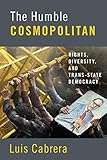Humble Cosmopolitan : Rights, diversity and trans-state democracy
By: Cabrera, Luis.
Publisher: New York Oxford University Press 2020Description: xix,340p.ISBN: 9780190869519.Subject(s): Democracy -- Cosmopolitanism -- Political Science -- Political and social viewsDDC classification: 327.101 Summary: Is a strong cosmopolitan stance irretrievably arrogant? Cosmopolitanism, which affirms universal moral principles and grants no fundamental moral significance to the state, has become increasingly central to normative political theory. Yet, it has faced persistent claims that it disdains local attachments and cultures, while also seeking the neo-imperialistic imposition of Western moral views on all persons. The critique is said to apply with even greater force to institutional cosmopolitan approaches, which seek the development of global political institutions capable of promoting global aims for human rights, democracy, etc. This book works to address such objections through developing a novel theory of cosmopolitan political humility. It draws on the work of Indian constitutional architect and social activist B.R. Ambedkar, who cited universal principles of equality and rights in confronting domestic exclusions and the "arrogance" of caste. He sought to advance forms of political humility, or the recognition of equal standing, and openness to input and challenge within political institutions. This book explores how an "institutional global citizenship" approach to cosmopolitanism could similarly promote political humility globally, by supporting the development of democratic input and challenge mechanisms beyond the state. Such developments would challenge an essential political arrogance identified in the current system, where sovereign states are empowered to simply dismiss rights-based challenges from outsiders or their own populations--even as they serve as the designated guarantors of human rights. The book employs an innovative grounded normative theory method, where extensive original field research informs the development of moral claims. Insights are taken from Dalit activists reaching out to United Nations human rights bodies for support in challenging caste discrimination, and from their critics in the governing Bharatiya Janata Party. Further insights are drawn from Turkish protestors confronting a rising domestic authoritarianism, and from UK Independence Party members demanding "Brexit" from the European Union--in part because predominantly Muslim Turkey could eventually join. Overall, it is shown, an institutional global citizenship approach can inform the development of a global framework which would orient fundamentally to political humility rather than arrogance, and which could significantly advance global rights protections.| Item type | Current location | Call number | Status | Date due | Barcode |
|---|---|---|---|---|---|
 Books
Books
|
NASSDOC Library | 327.101 CAB-H (Browse shelf) | Available | 51243 |
Include Index
Is a strong cosmopolitan stance irretrievably arrogant? Cosmopolitanism, which affirms universal moral principles and grants no fundamental moral significance to the state, has become increasingly central to normative political theory. Yet, it has faced persistent claims that it disdains local attachments and cultures, while also seeking the neo-imperialistic imposition of Western moral views on all persons. The critique is said to apply with even greater force to institutional cosmopolitan approaches, which seek the development of global political institutions capable of promoting global aims for human rights, democracy, etc. This book works to address such objections through developing a novel theory of cosmopolitan political humility. It draws on the work of Indian constitutional architect and social activist B.R. Ambedkar, who cited universal principles of equality and rights in confronting domestic exclusions and the "arrogance" of caste. He sought to advance forms of political humility, or the recognition of equal standing, and openness to input and challenge within political institutions. This book explores how an "institutional global citizenship" approach to cosmopolitanism could similarly promote political humility globally, by supporting the development of democratic input and challenge mechanisms beyond the state. Such developments would challenge an essential political arrogance identified in the current system, where sovereign states are empowered to simply dismiss rights-based challenges from outsiders or their own populations--even as they serve as the designated guarantors of human rights. The book employs an innovative grounded normative theory method, where extensive original field research informs the development of moral claims. Insights are taken from Dalit activists reaching out to United Nations human rights bodies for support in challenging caste discrimination, and from their critics in the governing Bharatiya Janata Party. Further insights are drawn from Turkish protestors confronting a rising domestic authoritarianism, and from UK Independence Party members demanding "Brexit" from the European Union--in part because predominantly Muslim Turkey could eventually join. Overall, it is shown, an institutional global citizenship approach can inform the development of a global framework which would orient fundamentally to political humility rather than arrogance, and which could significantly advance global rights protections.


There are no comments for this item.